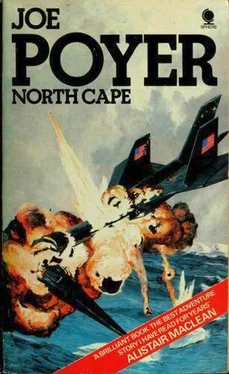“Twelve hours…” Folsom made an elaborate face. “Way too long. Try and cut that in half.” Barrows turned a startled face. “In half! For God’s sake, what do you think we are, miracle men?” Nevertheless, he reached for a microphone and roared, “All right, you half-witted slackers. The Exec wants that number three engine operating in four hours. So — get off your tails and move.”
“Six hours…” he mumbled.
“It is rather important We are going to come about at 0400, and if the seas or the winds get any worse, we are going to need all the power we can get. I sure would hate to see this bucket swing into a turn and keep right on going — straight down. Which brings me to the next point. Isn’t there anything you can do about the ice on the deck? We are carrying nearly four hundred tons right now and the ship is so damn low she looks like a submarine.”
Barrows scratched his head. “I sure as hell don’t know what it would be. I am squeezing every last calorie of heat out of the reactor now. The cooling system is shut down for the lower decks and I’m saving the reactor cooling system until we do come about. If I switch it off now, the reactor is going to overheat.”
“Okay, I’ll leave the details up to you. But the computer shows that if the ice-build-up rate continues steady, we are going to have about a hundred and fourteen more tons of the stuff on the deck by 0300. And that is going to make coming about very, very touchy.”
Barrows tapped his fingers nervously on the console. “All right, let me see if we can come up with something else that will help the deck heaters out. Forty years ago — they tell me — they never worried much about ice build-up. If the deck heaters couldn’t keep up, they just gave a hundred or so sailors safety lines and buckets of ashes and told them to go to it. But what the hell can you do with eighty men, sixty of whom are on duty during general quarters at any one time, and no ashes.” He shook his head. “Progress. Sometimes it does more to work against you than for you.” Folsom grinned and left, after extracting a promise to get the number three engine back on line as soon as possible. He went directly up to the bridge and to the computing table. As he climbed into his high seat again, he switched on the navigation course plot and studied the fine red line that had marked their progress since 1900 the previous evening. The red progress line was superimposed onto the projected course and showed every little deviation from the plot. But it was running fourteen miles behind; it was clearly indicated by an angry red circle encompassing the end point of both lines. He sat at the console, unconsciously tapping a pencil while he tried to figure a way out. Increased speed would apply more pressure to the bow. If they camelate to the turnaround; point, they would be late to the rendezvous. If they stayed behind — and the computer showed that, given the same conditions, at turnaround time they would be thirty-two miles short — they would not be in the lee of the North Cape. And with the ice building up at an ever-increasing rate, it would be far too risky to attempt the turn in the open seas.
Folsom swiveled to stare out the forward ports. The heavy gray sky formed a low-hanging ceiling barely clearing the mountainous seas. It was now nearly 1100, one hour past sunrise. But the sun, filtering down through thousands of feet of ice and storm cloud, shed very little light to relieve the funeral pall. The wind, throbbing around the ship and even through thick insulation, could be heard clearly above the low-key noises of the bridge. The barometer had dropped to the lowest point that Folsom had ever seen, 28.49 inches of mercury. He knew that the worst of the storm and winds were yet to come. And they were heading directly into the teeth of it — in fact, rushing headlong to meet it. The anemometer, clacking loudly on the masthead, was still registering a fairly steady wind speed of fifty-seven knots, a Force 11 wind, strong enough to blow the crests off the waves. As waves approach shore, an entirely different set of hydrodynamic principles come into play, and the waves become the more familiar breakers, with crests of roiling white water as they break on the beach. In mid-ocean, waves are usually long swells several hundred feet long, with a rounded bosom rolling to the far-distant shore. When the wind is strong, then the water forming the swell is pushed faster toward the crest so that it overshoots and falls free in a mass of white water. Out there, Folsom could see, the wind was blowing so hard that the water that was pushed over the crest was blown free into long streamers for fifty and sixty feet downwind. He shivered involuntarily before the frozen wastes of the Arctic Ocean.
But daydreaming would not solve his navigational problem, and for the hundredth time he damned the destroyer that had ripped their bow, thereby causing all these problems. With an undamaged bow, neither he nor Larkin would have worried about the effects of the angry seas on the bow. They would have put the ship onto a long, rectangular course until rendezvous time and the hell with the pounding on the bow. His thinking was interrupted by the appearance on the bridge of Barrows’ electronics crew. They politely elbowed him aside to get at the electrical conduits over his console to run temporary lines from the strain gauges in the bow. With nothing else to do for the moment, Folsom wandered around the bridge and the various consoles as unobtrusively as possible, stymied by the mathematics of the situation.
A half hour later he thought he was beginning to see a way out of the problem. The wind speed had increased another three knots and the seas were running to swells nearly sixty feet high. The wind was blowing steadily from the north-northwest quarter, deviating little from 10° north, which was what he had been half hoping for. For the past twenty minutes he had’ observed little or no deviation either in direction or speed. When he fed the new information into the course computers, it worked out perfectly. By falling off two points from the wind direction, he could bring the RFK farther to the west in a shallow arc that would increase the distance toward the Cape lee. Feeling very much like a skipper of a sailing ship, he ordered the course change to take advantage of the wind. The RFK rolled far to starboard as the two rudders inched over in response to the instructions from the bridge. The roll went on through thirty, then forty, then fifty, to fifty-seven degrees. Folsom watched the inclinometer with apprehension, and when the needle’ began to move back toward vertical, he let out a pent-up breath. Good lord, he thought, if she would go over that far with just a minor change with the wind, how would she handle when it came time to reverse course. He glanced around the bridge and saw that the others on watch were also looking at the inclinometer and were just as apprehensive as he.
At 1200, Larkin came onto the bridge. He nodded to the officer of the watch, signed the log, and came over to Folsom’s console. He turned, before saying anything to Folsom, and said, “Mr. Peterson, please stay on the bridge for a few minutes. I would like you to relieve me while Mr. Folsom and I go below.”
The second officer nodded and sank back into his high seat and began flipping through ship’s status report forms. Folsom unbuckled his seat belt and followed Larkin off the bridge, wondering what the captain had on his mind. Neither said a word until they entered Larkin’s quarters.
“Sit down, Pete.” He indicated a comfortable chair against the bulkhead. Folsom took the seat and glanced around at the comfortably appointed room. Larkin had thrown out the regulation Navy furniture as one of his first official acts on assuming command of the RFK, in the belief that a new skipper should assume all prerogatives in setting new traditions on a new ship. Certainly, the comfortable living-room-style furniture was much more relaxing than the hard-backed steel and plastic furniture that had been furnished by the shipyard.
Читать дальше












